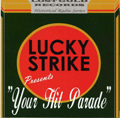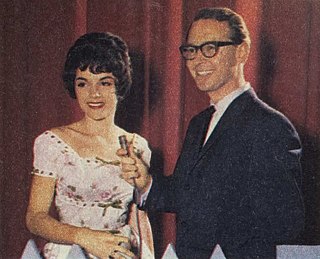Related Research Articles

Albert James "Alan" Freed was an American disc jockey. He also produced and promoted large traveling concerts with various acts, helping to spread the importance of rock and roll music throughout North America.

American Bandstand, abbreviated AB, is an American music-performance and dance television program that aired regularly in various versions from 1952 to 1989, and was hosted from 1956 until its final season by Dick Clark, who also served as the program's producer. It featured teenagers dancing to Top 40 music introduced by Clark.

Harold "Chuck" Willis was an American blues, rhythm and blues, and rock and roll singer and songwriter. His biggest hits, "C. C. Rider" (1957) and "What Am I Living For" (1958), both reached No.1 on the Billboard R&B chart. He was known as The King of the Stroll for his performance of the 1950s dance the stroll.

Your Hit Parade was an American radio and television music program that was broadcast from 1935 to 1953 on radio, and seen from 1950 to 1959 on television. It was sponsored by American Tobacco's Lucky Strike cigarettes. During its 24-year run, the show had 19 orchestra leaders and 52 singers or groups. Many fans inaccurately referred to the show as The Hit Parade.

Dinah Shore was an American singer, actress, and television personality, and the chart-topping female vocalist of the 1940s. She rose to prominence as a recording artist during the Big Band era. She achieved even greater success a decade later in television, mainly as the host of a series of variety programs for the Chevrolet automobile company.

Captain & Tennille were American recording artists whose primary success occurred in the 1970s. The husband-and-wife team were "Captain" Daryl Dragon (1942–2019) and Toni Tennille. They have five albums certified gold or platinum and scored numerous hits on the US singles charts, the most enduring of which included "Love Will Keep Us Together", "Do That to Me One More Time", and "Muskrat Love". They hosted their own television variety series on ABC in 1976–77.

James Frederick Rodgers was an American pop singer. Rodgers had a run of hits and mainstream popularity in the 1950s and 1960s. His string of crossover singles ranked highly on the Billboard Pop Singles, Hot Country and Western Sides, and Hot Rhythm and Blues Sides charts; in the 1960s, Rodgers had more modest successes with adult contemporary music.
Roulette Records was an American record company and label founded in 1957 by George Goldner, Joe Kolsky, Morris Levy and Phil Kahl, with creative control given to producers and songwriters Hugo Peretti and Luigi Creatore. Levy was appointed director.

Winston Conrad "Wink" Martindale is an American disc jockey, radio personality, game show host, and television producer. In his six-decade career, he is best known for hosting Gambit from 1972 to 1976, Tic-Tac-Dough from 1978 to 1985, High Rollers from 1987 to 1988, and Debt from 1996 to 1998.
Jack Scott was a Canadian-American singer and songwriter. He was inducted into the Canadian Songwriters Hall of Fame in 2011 and was called "undeniably the greatest Canadian rock and roll singer of all time."
The Buddy Deane Show was an American teen dance television show, created by Zvi Shoubin, hosted by Winston "Buddy" Deane (1924–2003), and aired on WJZ-TV, the ABC affiliate station in Baltimore from 1957 until 1964. It was similar to Philadelphia's American Bandstand.

"Who's Sorry Now?" is a popular song with music written by Ted Snyder and lyrics by Bert Kalmar and Harry Ruby. It was published in 1923, when Isham Jones had a major hit with it. Other popular versions in 1923 were by Marion Harris, Original Memphis Five, Lewis James, and Irving Kaufman.

The Diamonds are a Canadian vocal quartet that rose to prominence in the 1950s and early 1960s with 16 Billboard hit records. The original members were Dave Somerville (lead), Ted Kowalski (tenor), Phil Levitt (baritone), and Bill Reed (bass). They were most noted for interpreting and introducing rhythm and blues vocal group music to the wider pop music audience. Contrary to a popular myth, the father of Tom Hanks was never a member of the group.

"At the Hop" is a 1950s pop song written by Artie Singer, John Medora, and David White and originally released by Danny & the Juniors. The song was released in the fall of 1957 and reached number one on the US charts on January 6, 1958, becoming one of the top-selling singles of 1958. "At the Hop" also hit number one on the R&B Best Sellers list. Somewhat more surprisingly, the record reached #3 on the Music Vendor country charts. It was also a big hit elsewhere, which included a number 3 placing on the UK charts.

Bandstand is an Australian live pop music, variety television program screened from November 1958 to June 1972. Featuring both local and international music artists, and produced in-house at the studios of the Nine Network in Willoughby, New South Wales, it was originally broadcast only in New South Wales, It became a national program in the early 1960s as the network expanded into other Australian states. The host of Bandstand for its entire existence was radio presenter and television newsreader Brian Henderson.

Lost television broadcasts are mostly those early television programs which cannot be accounted for in studio archives usually because of deliberate destruction or neglect.
The Hit Parade was an early Australian television pop music series which aired on the Seven Network's HSV-7 from 1956 to 1959. It is often mentioned in books discussing Australian television of the 1950s.
The Astor Show was an Australian television series which aired in 1958 on Melbourne station GTV-9. In the series, the cast danced to and mimed hit recordings. The series ended with the 31 August 1958 broadcast. The timeslot of the series was then occupied for several weeks by a series of specials starring Shirley Abicair, and later by an American drama series.
At Your Request was an Australian television daytime series which aired from 1958 to 1959. The series aired on Tuesdays at 2:30PM on Melbourne station HSV-7, and was hosted by baritone Charles Skase, who was also known as a radio personality. Information on this series is scarce. The series presented requested songs, but it is not clear how these songs were presented. The archival status of the series is also not known, although being a daytime series aired in a single city means it is unlikely that kinescope recordings exist of it.
Juke Box Saturday Night was a short-lived Australian television series which aired on Melbourne station GTV-9 from around November 1957 to January 1958.
References
- ↑ Place, Nicko (8 March 2013). "Other writing: The birth of TV in Australia". Nick Place: creative. Archived from the original on 20 January 2018. Retrieved 19 January 2018.
- ↑ "YOUR HIT PARADE". National Film and Sound Archive . Retrieved 20 January 2018.